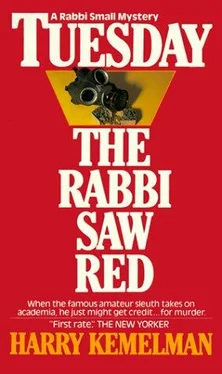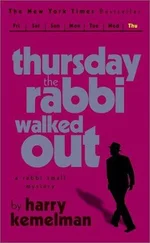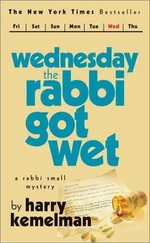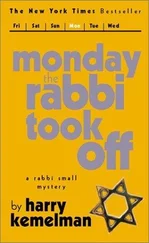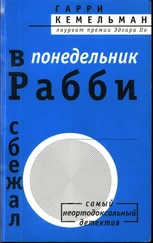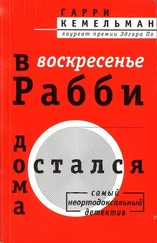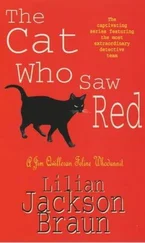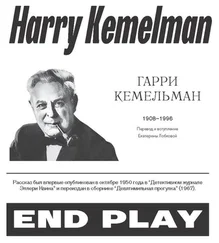Гарри Кемельман - Tuesday The Rabbi Saw Red
Здесь есть возможность читать онлайн «Гарри Кемельман - Tuesday The Rabbi Saw Red» весь текст электронной книги совершенно бесплатно (целиком полную версию без сокращений). В некоторых случаях можно слушать аудио, скачать через торрент в формате fb2 и присутствует краткое содержание. Год выпуска: 2010, Жанр: Классический детектив, на английском языке. Описание произведения, (предисловие) а так же отзывы посетителей доступны на портале библиотеки ЛибКат.
- Название:Tuesday The Rabbi Saw Red
- Автор:
- Жанр:
- Год:2010
- ISBN:нет данных
- Рейтинг книги:5 / 5. Голосов: 1
-
Избранное:Добавить в избранное
- Отзывы:
-
Ваша оценка:
- 100
- 1
- 2
- 3
- 4
- 5
Tuesday The Rabbi Saw Red: краткое содержание, описание и аннотация
Предлагаем к чтению аннотацию, описание, краткое содержание или предисловие (зависит от того, что написал сам автор книги «Tuesday The Rabbi Saw Red»). Если вы не нашли необходимую информацию о книге — напишите в комментариях, мы постараемся отыскать её.
The fifth in a series of definitive editions of Rabbi David Small mysteries by award-winning author Harry Kemelman!
Tuesday The Rabbi Saw Red — читать онлайн бесплатно полную книгу (весь текст) целиком
Ниже представлен текст книги, разбитый по страницам. Система сохранения места последней прочитанной страницы, позволяет с удобством читать онлайн бесплатно книгу «Tuesday The Rabbi Saw Red», без необходимости каждый раз заново искать на чём Вы остановились. Поставьте закладку, и сможете в любой момент перейти на страницу, на которой закончили чтение.
Интервал:
Закладка:
Harry Kemelman
Tuesday the Rabbi Saw Red
CHAPTER ONE
"What do you mean you're not interested?" George Chernow, short, square, and now choleric, glared his indignation at his daughter. "I've been selling Lubovnik the Caterers insurance for years, the least you can do is let them bid on the job." In a voice loud enough to penetrate to his wife, who had retreated to the kitchen and intended to remain there, he continued. "One hand washes the other, don't it? I sell insurance and they sell catering, all right, you don't buy catering every year, but if I'm marrying off a daughter, so the next time I see Morris Lubovnik about his coverage and he asks me about the wedding. I'm supposed to say we didn't ask you to bid on account my daughter wasn't interested? And don't try to tell me I don't have to tell him,” he added, and then answered: "A wedding is something you can keep secret?"
"Because I know the stuff he does, and I can't stand it." His daughter. Edie, turned her head aside and gave a stylized shudder. "Yech! The greasy chicken soup, the oily knishes, the chopped liver mold—"
"So pick something else. Talk it over with him. Let him show you some sample menus, at least he'll know we're not ignoring him."
"All right! All right! So I'll talk to him already," said Edie. "But I'm warning you, here and now, if he can't come up with the type food I want I'm not having him no matter how much insurance he buys from you. I didn't want this kind of wedding in the first place, and I can still go off somewhere and marry Roger quietly without all this fuss."
This last was the tactic she had employed from the beginning to bring her parents to heel. When she had first told them she was marrying Roger Fine, she said she wanted just a little party, "you people and his folks and some of our personal friends, and that's it. None of this big shmeer with the wedding cake and the ringbearer and the ushers and the maids of honor."
But the little party had grown as they discussed it. "How can I marry off my daughter without inviting my Uncle Joshua who was practically a father to me after my own father died?"
"Then that means I'll have to invite my Aunt Rose who is as close to me as Joshua is to you." Mrs. Chernow pointed out. "And that means I'll have to invite the girls too, because they live in the same apartment house."
"But the girls are only second cousins to you."
"But I’ve been close to them all my life. Besides. Rose would drive down, so there'll be plenty of room in the car and the girls can help out with the driving. New York is a long way for Rose to drive alone."
Before they knew it, the guest list had swelled from Edie's original dozen to over a hundred, and with that many people you couldn't have just a quiet little dinner in a restaurant. It had to be in a hall, and catered. Which meant, of course, an orchestra and dancing because you couldn't have a hundred people, most of them strangers to each other, just wandering around until it was time to eat, and afterward you couldn't just send them home. Besides, what kind of wedding is it without dancing? And that meant a proper gown for the bride. "Everybody will come all dressed up, and you'll wear a tweed suit?"
So Edie went to New York because, as she explained it to Selma Rosencranz, her best friend, "There isn't a thing to be had in Boston, not one single solitary thing that is halfway decent."
This, her father at least, had difficulty in believing, especially after he got the bill. "In the whole city of Boston she couldn't find a dress?"
"You want her to look nice, don't you?" Mrs. Chernow demanded fiercely. "You got one child, and she's getting married, a once-in-a-lifetime thing, and you want to scrimp on it? She'll get up to dance with the groom, alone in the middle of the floor, everybody looking, and you want her to be wearing some old hand-me-down?"
"They'll dance? He can dance?" asked Mr. Chernow with feigned incredulity, thereby renewing the argument he had been having with his wife— never in the presence of their daughter, of course— ever since he learned he was about to acquire Roger Fine as a son-in-law: for the young man was slightly lame and walked with a cane. "I have one daughter, a good-looking girl, and young, and the best she can get is damaged goods?"
"He's a little incapacitated. So what? And it's from the war."
"It's not from the war, he got it during the war. It's a kind of arthritis, he told me so himself, he had a desk job in Saigon his whole duty."
"So what? Does it interfere with his work?"
Which touched still another sensitive spot with Chernow: Roger Fine was a teacher, and what kind of living can a teacher make?
"He's not just a teacher." Mrs. Chernow insisted. "He's a professor. Of English. In a college."
"Assistant professor."
"So assistant professor. What do you expect? He's a young man. It's his first job."
It wasn't only the young man's profession that irritated Chernow, however; it was his whole style and manner, he was so sure of himself, so positive in his opinions; and his opinions were not those of Chernow, he listened, when Chernow talked of politics, for example, as he might listen to the barber who was cutting his hair or the cab driver who was driving him to the airport— politely but without interest. Chernow suspected he was a radical. Who knows, maybe even a Communist.
Because his catering business was strictly kosher. Morris Lubovnik of "Lubovnik the Caterers— We Catered Your Mother's Wedding" kept his hat on as he perched on the edge of the sofa, his menus and price lists spread out on the large square coffee table before him. Edie Chernow, her round little rump encased in tight black satin pants, sat at the other end of the sofa, one leg crossed under her, the other dangling over the edge of the sofa, pretending to listen, she had made up her mind as soon as he entered, the minute she saw the shapeless felt hat with the greasy headband, the beads of sweat on the forehead, the blue jowls, the hoarse rasping voice. Lubovnik glanced down at the floor as he talked, or at his papers on the table, careful never to look directly at her lest he appear to be staring at the skintight pants or at her breasts clearly outlined under her lowcut white nylon blouse, he cleared his throat.
"It's not just a matter of business with me. Miss Chernow. I want only my customers should be satisfied. I want that weeks later they should be able to close their eyes and taste again the deliciousness of the knishes and the meatballs." He closed his eyes and smacked his lips.
"Now you can have either the roast beef or the roast chicken for the same price, with our customers we got two types: those who swear Lubovnik's roast beef is the best thing they ever tasted and those who say it's the roast chicken." He smiled broadly to indicate it was his little joke. "Now here,” he dived into the suitcase resting on the floor and brought forth a small card, "here is something that's been very popular with our patrons the last few years. You send it out with the invitations and it lets the guest pick out ahead of time which he wants, the chicken dinner or the roast beef. In that way everybody is satisfied. Now here's a picture of a sweet table we catered a couple of months ago." Edie finally managed to get rid of him, promising to study the sample menus he left with her. But even as she edged him to the door, he stopped several times to search in his brief case for photographs, letters from satisfied customers. "That reminds me, only last week..."
Totally different was the man from "Stillman's of Boston. Founded 1890." He was young for one thing, not more than thirty, and dressed modishly in gray flannel slacks with a slight flare and a tartersall-check sports jacket, and he was not pushy; quite the opposite in fact, he seemed reserved and somewhat doubtful. "We don't go in for ethnic foods, Miss Chernow. Those knishes and that stuffed derma are quite tasty, although a little on the heavy side for me, but we don't do them, I'm afraid, we favor bland hors d'oeuvres: tiny sandwiches of cucumber, salmon, or crabmeat salad, with perhaps fried shrimp with the drinks, we feel that the appetizer should stimulate and arouse the appetite, not kill it. You don't want the meal itself to be an anticlimax, do you?" Edie agreed with him.
Читать дальшеИнтервал:
Закладка:
Похожие книги на «Tuesday The Rabbi Saw Red»
Представляем Вашему вниманию похожие книги на «Tuesday The Rabbi Saw Red» списком для выбора. Мы отобрали схожую по названию и смыслу литературу в надежде предоставить читателям больше вариантов отыскать новые, интересные, ещё непрочитанные произведения.
Обсуждение, отзывы о книге «Tuesday The Rabbi Saw Red» и просто собственные мнения читателей. Оставьте ваши комментарии, напишите, что Вы думаете о произведении, его смысле или главных героях. Укажите что конкретно понравилось, а что нет, и почему Вы так считаете.
